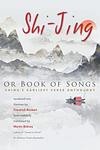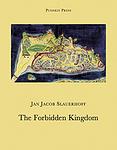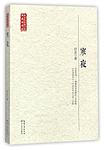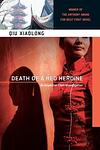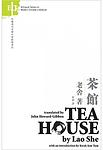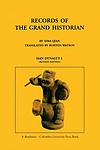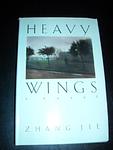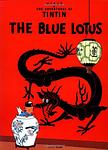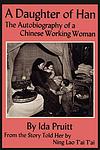The Greatest "China" Books of All Time
Click to learn how this list is calculated.
This list represents a comprehensive and trusted collection of the greatest books. Developed through a specialized algorithm, it brings together 300 'best of' book lists to form a definitive guide to the world's most acclaimed books. For those interested in how these books are chosen, additional details can be found on the rankings page.
Genres
The "China" category for books encompasses a wide range of literature that explores the history, culture, politics, and society of China. This includes works of fiction and non-fiction, spanning from ancient times to the present day. Books in this category may delve into topics such as Chinese philosophy, art, cuisine, and language, as well as contemporary issues such as economic development, human rights, and environmental concerns. Overall, the "China" category offers readers a diverse and rich collection of books that provide insight into one of the world's oldest and most complex civilizations.
Countries
Date Range
Reading Statistics
Click the button below to see how many of these books you've read!
Download
If you're interested in downloading this list as a CSV file for use in a spreadsheet application, you can easily do so by clicking the button below. Please note that to ensure a manageable file size and faster download, the CSV will include details for only the first 500 books.
Download-
26. The Three-Body Problem by Cixin Liu
The book is a science fiction novel that intertwines the cultural revolution of China with a complex narrative involving astrophysics, virtual reality, and alien contact. It follows a disillusioned scientist who, after suffering personal tragedy during the Cultural Revolution, sends a message into space, only to receive a response from an alien civilization on the brink of destruction. As the aliens plan their migration to Earth, a secret organization works to facilitate the invasion, while a disparate group of scientists and military personnel attempt to understand and prevent the impending extraterrestrial crisis. The novel grapples with themes of human nature, technological advancement, and the vast, often incomprehensible universe.
-
27. The Book of Songs by China
"The Book of Songs" is a collection of ancient Chinese poetry, providing a rich cultural and historical insight into early Chinese society. The anthology includes various types of poems, such as folk songs, hymns, and courtly songs, reflecting the life, customs, and beliefs of different social classes. It serves as a significant literary work and historical document, revealing the evolution of the Chinese language, thoughts, and values over centuries.
-
28. Platform Sutra by Huineng
The "Platform Sutra" is an essential text in Zen Buddhism, presenting the teachings and philosophy of a renowned sixth patriarch. The book offers deep insights into the nature of enlightenment and the practice of dhyana (meditation). It emphasizes the concept of 'sudden enlightenment', asserting that it can be achieved by realizing one's own 'Buddha nature'. The text is also known for its promotion of direct, personal experience and the potential for enlightenment in all beings, irrespective of their social or educational status.
-
29. Collected Stories by W. Somerset Maugham
"Collected Stories" is an anthology of tales that offers a broad range of human experiences, emotions, and dilemmas. The stories, set in a variety of locations around the world, explore themes such as love, betrayal, war, and societal norms. The author's keen observations of human nature and his skillful storytelling provide a captivating and thought-provoking reading experience.
-
30. Travels With Myself And Another by Martha Gellhorn
In this vivid memoir, a renowned journalist recounts her adventures across the globe during the mid-20th century, sharing tales of her journeys alongside a mysterious companion referred to as "another." With a sharp wit and a keen eye for detail, she navigates through various landscapes, from the treacherous terrains of China during the Sino-Japanese War to the unforgiving deserts of Africa. Her stories are filled with humor, humanity, and a relentless quest for truth, offering a window into the tumultuous world events of her time as well as a deeply personal narrative of a woman who lived fiercely and fearlessly, embracing the world with an insatiable curiosity.
-
31. Travels by Marco Polo
This book is a detailed account of a Venetian merchant's extensive travels throughout Asia during the 13th century. The narrative provides a comprehensive exploration of the diverse cultures, customs, landscapes, wildlife, and wealth of the Eastern world, including the Mongol Empire and China, where the author spent time in the court of Kublai Khan. His descriptions of the grandeur and sophistication of these civilizations challenged European assumptions about the East, and his tales of exotic wonders and adventures continue to captivate readers today.
-
32. The Gate of Heavenly Peace by Jonathan Spence
"The Gate of Heavenly Peace" is a comprehensive historical analysis of China from the 1890s through the 1980s, focusing on the intellectual and political movements that shaped the country. The book explores the complex interplay between tradition and modernity, and the often tumultuous relationship between the Chinese people and their leaders. It delves into the lives and thoughts of key figures in Chinese history, providing a nuanced understanding of the forces that have shaped China's trajectory.
-
33. The Forbidden Kingdom by Jan Jacob Slauerhoff
"The Forbidden Kingdom" is a historical fiction novel that intertwines the stories of two men, a 20th century sailor and 16th century Portuguese poet, Luis Camões. The narrative alternates between the two, exploring the sailor's obsession with the poet's life and the poet's experiences in the East, including his journey to Macao. The book delves into themes of identity, obsession, and the clash of Eastern and Western cultures.
-
34. Cold Nights by Ba Jin
"Cold Nights" is a poignant love story set in the backdrop of China's turbulent political climate during the 1940s. The narrative follows the protagonist, Wan Da, as he navigates through the hardships of life, love, illness, and death. As his wife, Zhenzhen, falls ill with tuberculosis, Wan Da's struggle to secure medical help for her amidst the chaos of war paints a vivid picture of human endurance and the power of love. The book also explores themes of existentialism and the human condition, offering a profound look at life's hardships and the strength of the human spirit.
-
35. The Death of Woman Wang MMP by Jonathan Spence
"The Death of Woman Wang MMP" is a historical narrative that vividly portrays 17th-century rural China, specifically the T'an-ch'eng county in Shantung province. The book focuses on the lives of ordinary people, their struggles, and the harsh realities they face, using the tragic story of a woman named Wang as the central narrative. It also provides a detailed account of the local judicial system and the role of the local historian, all of which are interwoven to create a comprehensive picture of the society and culture of the era.
-
36. Death Of A Red Heroine by Qiu Xiaolong
"Death Of A Red Heroine" is a crime novel set in 1990s Shanghai, China. The story follows Inspector Chen Cao as he investigates the murder of a young woman, whose body is found in a canal. As Chen delves deeper into the case, he uncovers a web of corruption, political intrigue, and personal secrets that challenge his loyalty to the Communist Party and force him to confront the complexities of modern Chinese society. Through vivid descriptions of Shanghai's changing landscape and insightful commentary on social issues, the novel offers a captivating portrayal of a country in transition.
-
37. A Hero Born by Jin Yong
"A Hero Born" is the first installment in an epic martial arts saga set in the Song Dynasty of China, where the story follows the life of Guo Jing, a young boy from a humble background. After his father, a loyal Song patriot, is murdered, Guo Jing is raised by Genghis Khan in the Mongolian steppes. Throughout his adventures, he encounters a diverse cast of characters, learns from legendary martial arts masters, and is imbued with the values of honor, loyalty, and the complex moralities of warfare and brotherhood. His destiny is intertwined with the fate of his nation as he embarks on a quest to become a true hero and to confront formidable enemies that threaten the very fabric of the martial arts world.
-
38. Teahouse by Lao She
"Teahouse" is a historical drama that explores 50 years of Chinese history (1898-1948) through the microcosm of a Beijing teahouse. The narrative follows the lives of the teahouse owner and his customers, reflecting the social changes, political turmoil, and cultural shifts of the time. The story provides a deep insight into the Chinese society, its traditions, and the impact of Western influence. It also highlights the struggle of the common people amidst corruption, oppression, and the collapse of traditional values.
-
39. Records of the Grand Historian by Sima Qian
"Records of the Grand Historian" is an ancient Chinese text that provides a comprehensive history of China, from the earliest times up to the author's own period. The book is divided into five parts: the Basic Annals, the Chronological Tables, the Treatises, the Hereditary Houses, and the Biographies. It covers the lives of significant figures, political events, cultural developments, and much more. The author's objective and critical approach to history has had a profound influence on Chinese historiography and continues to be a valuable resource for understanding ancient Chinese history and culture.
-
40. Heavy Wings by Zhang Jie
"Heavy Wings" is a novel that explores the societal changes in China during the late 20th century. It follows the story of a group of innovative engineers striving to design and build China's first large-scale commercial aircraft. Despite facing numerous challenges such as lack of resources, political interference, and personal struggles, they remain committed to their mission, symbolizing the spirit of perseverance and innovation. The story is a reflection of China's journey towards modernization and technological advancement.
-
41. The Scholars by Wu Ching-tzu
The book is a satirical novel that offers a critical examination of the Chinese scholarly class and the civil service examination system of Imperial China. Through a series of interlinked stories, it follows the lives, careers, and misadventures of a diverse group of scholars, exposing the corruption, pettiness, and hypocrisy that pervade the academic and bureaucratic worlds. The narrative delves into the scholars' pursuit of literary glory and official rank, often at the expense of genuine morality and wisdom, providing a humorous yet poignant commentary on the social and educational values of the time.
-
42. Half of Man is Woman by Zhang Xianliang
This novel provides a deeply personal account of the author's experiences during China's Cultural Revolution and his subsequent imprisonment in a labor camp. The protagonist struggles with the harsh realities of his imprisonment, including starvation and physical abuse, while also grappling with his own identity and the societal expectations of masculinity. His release and subsequent marriage only further complicate his quest for self-understanding, as he navigates the challenges of reintegrating into society and maintaining a relationship with a woman who has her own traumatic past.
-
43. In Xanadu by William Dalrymple
"In Xanadu" is a travelogue that follows the journey of a young historian and writer as he retraces Marco Polo's route from Jerusalem to the fabled city of Xanadu in Mongolia. Along the way, the author weaves together a rich tapestry of history and adventure, engaging with diverse cultures and landscapes. His travels take him through the Middle East, South Asia, and into the heart of China, offering insights into the complex interplay between past and present, and the enduring allure of one of history's most legendary journeys. The narrative is as much a personal coming-of-age story as it is a homage to the spirit of exploration and discovery.
-
44. A Comparative Study Of Total Power by Karl Wittfogel
The book in question is a scholarly examination of the concept of 'hydraulic civilization,' a term used to describe societies that manage large-scale water projects such as irrigation and flood control. The author argues that the bureaucratic structures necessary to control water resources in arid regions historically led to the centralization of power and the development of autocratic or despotic forms of government. Through comparative analysis, the work explores how the management of water resources influenced social, economic, and political structures, and how this 'total power' shaped the civilizations in question, with a particular focus on Asia. The study delves into the relationship between natural environments, technological capabilities, and the evolution of political systems.
-
45. The Good Person of Szechwan by Bertolt Brecht
"The Good Person of Szechwan" is a parable play that explores the difficulty of maintaining one's morals and goodness in a corrupt and exploitative world. The story revolves around a kind-hearted prostitute who struggles to be a good person under the harsh realities of life in Szechwan. When three gods visit the city in search of a good person, they find only her willing to help them. However, to survive, she must adopt a ruthless alter ego, leading to a complex exploration of morality, identity, and societal pressures.
-
46. Science and Civilisation in China by Joseph Needham
"Science and Civilisation in China" is a comprehensive and authoritative series that explores the history of Chinese science, technology, and medicine. The series delves into the significant contributions China has made in various scientific fields, including astronomy, mathematics, physics, chemistry, biology, and medical science, among others. The author also examines the cultural, philosophical, and social contexts in which these scientific advancements took place, providing a holistic view of China's scientific history and its impact on the world.
-
47. The Blue Lotus by Hergé
In "The Blue Lotus," a young reporter is sent on a mission to Shanghai during the Sino-Japanese War, where he uncovers a dangerous opium trafficking operation. Along the way, he befriends a Chinese boy who helps him navigate the cultural and political complexities of the region. The story combines elements of adventure, mystery, and political intrigue, set against the backdrop of historical events.
-
48. A Daughter Of Han: The Autobiography Of A Chinese Working Woman by Ning Lao Tai-Tai, told to Ida Pruitt
This book provides a personal account of a woman's life in late 19th and early 20th century China, as she navigates the complexities of poverty, tradition, and societal upheaval. Through her eyes, readers experience the struggles of the lower classes, particularly for women, in a rapidly changing society. Her story is one of resilience and determination, as she confronts challenges such as opium addiction in her family, the death of her children, and the need to work as a servant and street peddler. Her narrative offers a vivid portrayal of the customs, family life, and social hierarchies of her time, providing a valuable historical perspective on the life of an ordinary woman in China.
-
49. Pavilion Of Women by Pearl S. Buck
The novel presents the story of a wealthy Chinese woman who, upon reaching her 40th birthday, decides to change the course of her life. She arranges a concubine for her husband to take over her marital duties and embarks on a journey of self-discovery and liberation. Throughout the narrative, she explores the constraints of traditional roles and the possibilities of intellectual and spiritual freedom, forming a deep connection with a foreign missionary. This relationship challenges her beliefs and the societal norms of the time, leading her to question the very foundations of her existence and her place in the world.
-
50. Crossings by Chuang Hua
The novel is a lyrical and fragmented exploration of identity, memory, and displacement, told through the eyes of a Chinese woman who emigrates to the United States. As she navigates her new life, the narrative delves into her past in China and her experiences in various Western countries, revealing the complex interplay between personal history and the broader historical forces at play. The protagonist's journey is marked by a search for belonging and understanding, as she grapples with the cultural and emotional crossings that define her existence. Through poetic prose, the book examines themes of alienation, the impact of war, and the quest for self amidst the tumult of the 20th century.
Reading Statistics
Click the button below to see how many of these books you've read!
Download
If you're interested in downloading this list as a CSV file for use in a spreadsheet application, you can easily do so by clicking the button below. Please note that to ensure a manageable file size and faster download, the CSV will include details for only the first 500 books.
Download
